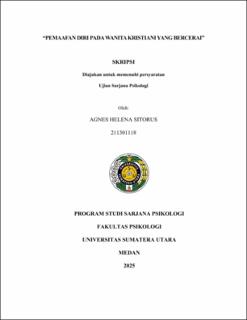Pemaafan Diri pada Wanita Kristiani yang Bercerai
Self-Forgiveness in Divorced Christian Women

Date
2025Author
Sitorus, Agnes Helena
Advisor(s)
Tuapattinaja, Josetta Maria Remila
Metadata
Show full item recordAbstract
Divorce often triggers negative emotions such as shame, guilt, and regret—especially among Christian women, as it conflicts with their faith values. These negative emotions can affect psychological well-being, making self-forgiveness essential. According to Enright (1995), self-forgiveness is an individual's willingness to release negative emotions and foster self-love through four dynamic phases: uncovering, decision, work, and deepening. This study aims to understand the process of self-forgiveness in Christian women who have experienced divorce using a qualitative approach with interviews involving three participants. The results show that two participants were able to release negative emotions, while one participant remained stuck in them. All three experienced the uncovering phase, marked by guilt and regret. Participants 1 and 3 proceeded to the decision phase, choosing not to remain trapped in regret. During the work phase, they stopped excessive self-blame and engaged in religious activities such as Sunday services and prayer fellowships. They reached the deepening phase, marked by acceptance of divorce as part of their life journey. In contrast, participant 2 remained in the uncovering phase, unable to forgive herself for violating her Christian beliefs, and had not yet entered the decision, work, or deepening phases.
Collections
- Undergraduate Theses [1451]
